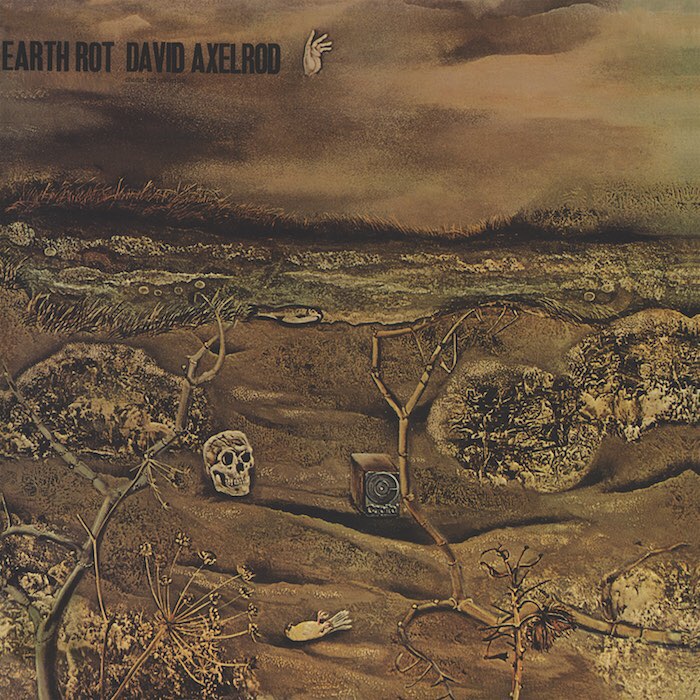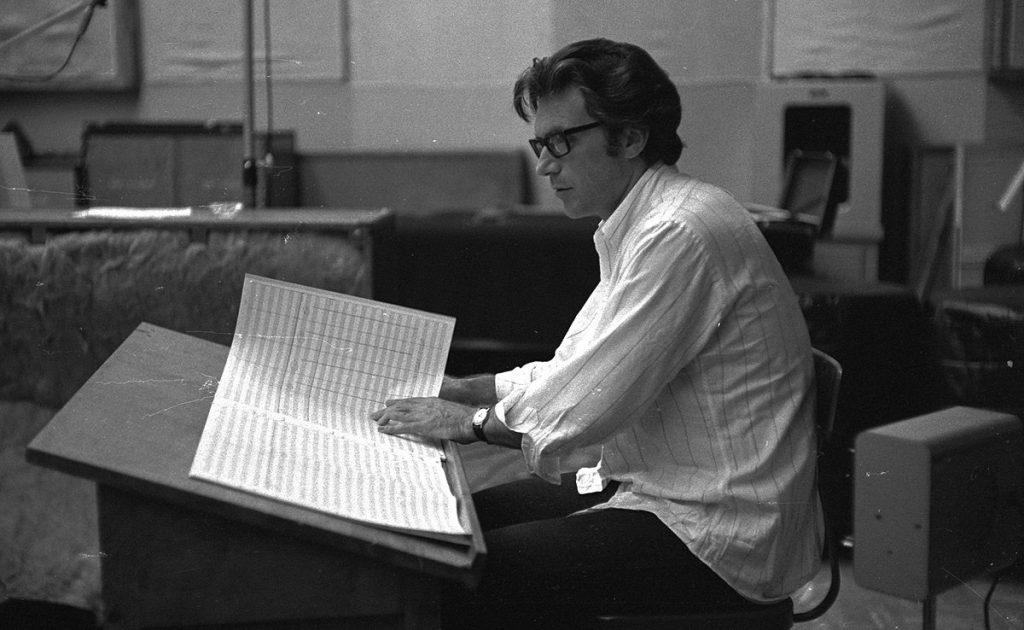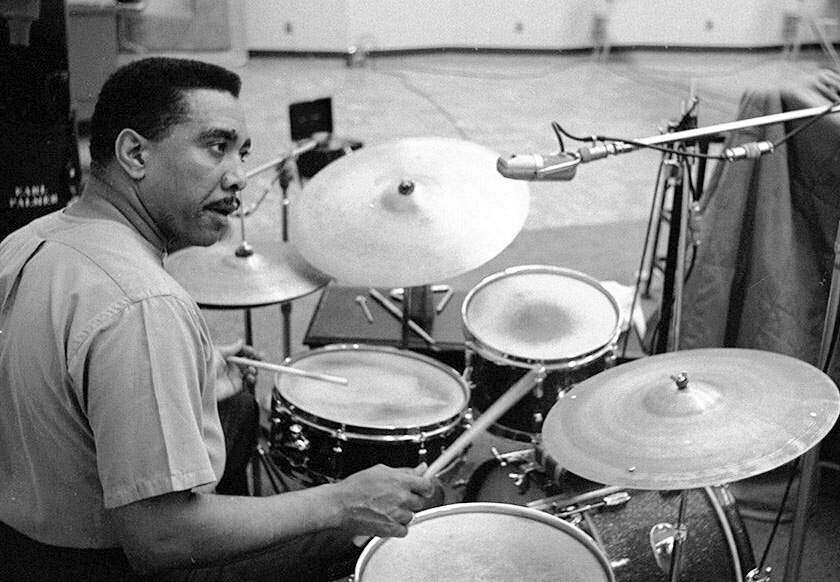

This reissue of Axelrod’s 1970 eco-doom masterpiece is great. Really, really, really great! Six stars great!!!
This Now Again reissue presents the original recording in full, and follows that with an all instrumental recapitulation. We’ll come back to this later.
The original album starts with a slightly dated and rather odd little spoken word cameo, with female and then male voices declaiming a little bit of Biblical type scripture (‘In the beginning…’ etc). Not at all sure what I make of that? But, well… whatever, as folk say these days!
Then the music begins. And the music itself is just terrific. But I’ll return to this subject in a bit more detail later. Before that it’s worth noting that with this 2018 re-release there’s lots to read and look at: great unabashed fan-boy style liner notes, by Eothen Alapatt, and plenty of rather cool pic’s, of Axe and co at work.

And then, as noted above, there’s the fact that the musical content is doubled, by the inclusion of instrumental versions of everything. Love it!
What to say about the music? Well, first off, this, the third of Axelrod’s trio of solo albums for Capitol, it was also the first to feature vocals. And not standard vocals either, but spoken word and ‘choral’ type lyrics. The eco-doom theme is an odd but prescient one. I’ll come back to why it’s so odd later.
But I have to confess, whilst I love the original recording, for its oddball singularity, I think I might, initially at least, prefer the instrumental versions of the tracks. In terms of pure music. And I can kind of see why his first two albums were strictly instrumental.
That said, I dig both. What he’s trying to say is great. And I think had he continued to plough similar furrows, he’d have cracked an even better marriage of word and music than he achieves here.
But my views may change over time? Who knows! And I’m not meaning to damn the vocal version with faint praise. I think it’s pretty extraordinary. And I love it all. Both as vocal and instrumental music.
Instrumentally it’s very much like the previous two albums, mixing funky soulful jazziness with slightly modern ‘composing’. I wouldn’t call it ‘classical’, exactly. Orchestral? Certainly. Although he uses mainly ‘pad’ type pillows of strings and brass.
The backing band instrumentation and playing is worthy of some analysis. Earl Palmer’s drumming is very much groove based, and, partnered with the bright elastic funkiness of Bob West’s electric bass*, beds everything on a springy lithe mattress of percolating funky soul vibes, with just a hint of jazziness.
The keys and guitars range from acoustic picking, to fuzzed out leads, glassy gliss’ed electric strumming, and everything from piano to vibes.
There’s occasional moments of lead or solo style melodies from horns, even a little flight on a violin. But by and large the music is both thematic and textural, as opposed to melody driven. Frequent repetition of certain chords, or harmonies, or even phrases or figures lend the whole a suite like homogeneity.
As I work on this, I’m re-listening to it all again. For possibly the fourth time today. And the vocal stuff is really growing on me. Probably more for the pure musicality of it all, as opposed to the message. Although as message music goes, whatever one thinks of how it’s been done here, it sure knocks the spots off the tidal waves of meaningless dross pumped out by the pop-music machinery.
Where the latter endlessly reinforces the vacuity of a shallow culture of constant ego-feeding display dependency, a part of the consumer culture that helps bring us closer to eco-doom, for all its hippy-era earnestness, the message here has a consciousness that goes beyond the solipsistic self-obsession of our Twitter-age.
So, taking the vocals and words away, which initially makes the ‘pure music’ on offer here slightly more palatable to a contemporary taste, is perhaps too much like vandalism? I dunno… I can only say that personally I like both. And having the choice to enjoy either, or both, is great.
But I want to briefly return to the idea of the oddness of this whole package. I’m not one for opera, rock, religious, or otherwise. But it can’t be denied that this does make me think of a kind of ‘hippy eco opera’. But with lines like ‘there is a growing rotten-mess’, it’s hardly your Hair or Jesus Christ Superstar!
Indeed, the groovily beautiful nature of the music sits a tad awkwardly with the ‘conceptualism’ of much of Axe’s music in this period. I find it a little tricky to connect the ostensible subjects – be they the poetry of Blake, or the coming eco-doom – with the beauty and joie de vivre of the music.
One last observation, and that’s to do with how Axe has enjoyed a renaissance thanks, undeniably, to hip-hop producers and rappers sampling his music. Or should that be stealing his thunder? Basking in his reflected glory!?
I have to confess that, other than one DJ Shadow track, I’m not familiar with what these later folk have done with Axe’s legacy. I suppose – whatever I might think of their usage of him – I ought to at least be glad that through their interest some of his music has been reissued.
But truth to be told, although I don’t mind some rap/hip-hop, I’m usually a much bigger fan of stuff they might occasionally sample. And that’s very much the case here.
I’m happy taking a deep bath in the musical rivers Axe tapped into and unleashed. And Earth Rot, like his two Blake inspired albums, is – for my money – totally and utterly sublime. The more I listen to it, the more I dig it!
Harmonically it just tickles my sweet spot. And there’s loads of beautiful breathy flute. The vibe is, despite the eco-doom stuff, predominantly upbeat, even if tinged, at times, with a melancholy. But I’ve always loved that hinterland, of intense happy-sad beauty.
And the interplay of the rhythm section is truly sublime. The music, occasionally richly think with layered harmonies, is just as frequently reduced to a sparse and minimalist stripped down state, so that the whole oscillates and shimmers, between the poles of lightness and power.
To me it’s truly mind blowing. When one finds music that speaks so directly and pin-point accurately to one’s own inner voice.

And as a drummer I can’t pass by without observing how wonderful Earl Palmer’s playing is. I’m so taken with it, I’ve ordered a copy of his autobiography. A cat with that much swing and soul, who’s played such a massive part in modern popular music? I need to know more!
Anyway, I have become a gushing fan-boy! And I’m not the least ashamed. I suspect that many won’t ‘get’ what it is I see and hear in this rather oddball stuff. But I truly couldn’t care less. For me there’s really naught to ‘get’, anyway. Either such music speaks to you, or it doesn’t.
And with Songs of Innocence, Songs of Experience and Earth Rot, senor Axe, he speaketh unto me, loud and clear. And I love it!
Can’t recommend this highly enough.
* Arthur Wright is also listed as playing bass. But wasn’t he more a guitarist?
